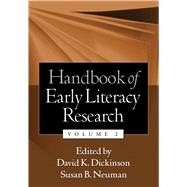Current research increasingly highlights the role of early literacy in young children's development--and informs practices and policies that promote success among diverse learners. The Handbook of Early Literacy Research presents cutting-edge knowledge on all aspects of literacy learning in the early years. Volume 2 provides additional perspectives on important topics covered in Volume 1 and addresses critical new topics: the transition to school, the teacher-child relationship, sociodramatic play, vocabulary development, neuroimaging work, Vygotskian theory, findings from international studies, and more.








